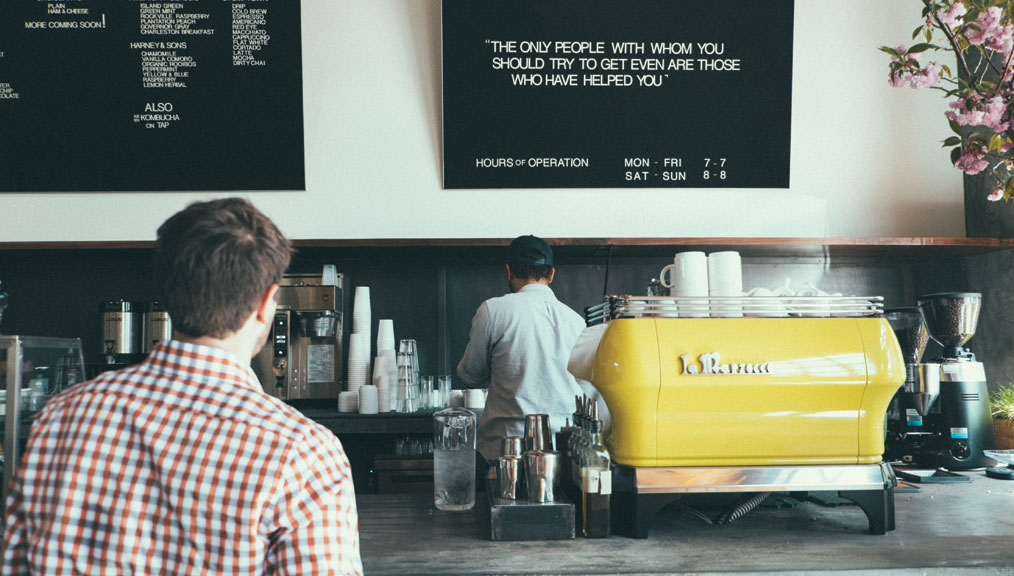[Y]ou’ve seen pictures of her rolling her eyes. You’ve watched videos of him being a jerk. You’ve read articles about how she’s driving people away from specialty coffee. You’ve looked at lists he’s written that explicate the things you, as customer, say that make him just hate you.
They are snobby baristas, and they are one of the most enduring tropes of our corner of the coffee industry, as well as one of our most successful exports to the broader culture. We hate the idea that our craft is undermined by people who are intentionally superior, willfully jerky. Why be elitist and mean in the service industry? we think.
Even Time magazine, in an article from all the way back in September, 2012, said the following about baristas:
These guys see coffee not just as a hot beverage to drink in the morning, but as a way of life, an attitude toward the world, a spiritual direction and, most importantly, a passionate political statement about how to strive for a better world.
Which is why everybody wants to kill them.
As you read articles, listicles, tweets, and Facebook posts, you’d be forgiven for believing that the primary obstacle facing independent coffee shops around the country is snobbish baristas who genuinely hate the idea of serving coffee to people who don’t know where or what Yirgacheffe is. Baristas who feign ignorance and project disdain when a customer orders a grande. Baristas who either can’t be bothered to explain what bright means or won’t stop talking even after it’s clear the customer wishes he had never asked what a natural coffee was.
Coffee knowledge, experience, and barista skills are great, but if you aren’t a friendly, customer-focused person, I’m not going to hire you. Period.
We know we’d never hire people who treated customers that way in our shops, and if we saw that kind of interaction, we’d root it out. Customers come first in this café, we’d say with conviction. There is no room for snobbery here!
That’s a comforting thought. It’s also a fiction we tell ourselves to ignore a bigger problem.
[H]ow often have you actually witnessed behavior like this? More often than not, when I experience less-than-stellar service in a café, the issue isn’t a comically elitist barista who looks down his nose at my lack of coffee gravitas; rather, it’s simply an apathetic person standing behind the counter, going through the motions. They don’t know much about the products they’re serving, they don’t know much about the coffee they’re purveying, and, most egregiously, they don’t care much about the people they’re talking to.
Ultimately, that’s the difference between a café that has a culture of hospitality, and one that doesn’t: baristas who act like they care about their customers.
But that’s so obvious and basic, you might declare, and rightly. And I’d reply, I know, right?
If it’s so obvious and basic, then, why do we so often find businesses operating without that key characteristic in their staff? Maybe customer service–focused people are difficult to find. Or maybe customer service is a difficult skill to train in someone who doesn’t possess a proclivity for it. I have taught hundreds of customer service classes in my career. Was the success or failure of those classes dependent on the natural inclinations of the students, or could the quality of my material and presentation instill hospitality?
That’s a scary question, because if the answer is that it depends mostly on the predisposition of the trainee, then I’m forced to ask another question: how on earth do I cultivate a culture of hospitality in my café?
First, it’s huge to even ask that question, because it indicates an endearing concern about your customers and your level of service. I want to go to a café where the ownership and management thinks about and worries about customer service. Next, the beginning of the answer to that question is the foundation upon which every other part is dependent: hire for customer service first. Coffee knowledge, experience, and barista skills are great, but if you aren’t a friendly, customer-focused person, I’m not going to hire you. Period.
Coffee knowledge only goes so far, though, in a café environment. We sell a lot more than coffee.
I can train someone to pull beautiful shots of espresso, steam milk, and pour latte art—that’s a relatively easy task. I find it significantly more difficult to train someone to focus on people and care about them. There are customer service skills that are learned, to be sure. Those skills are infinitely easier to acquire, though, if you’re already a service-oriented person, a people person, if you will. Thus, step one in creating a culture of hospitality in your establishment is hiring people who are already on board with the idea of hospitality, because they will be trainable in a way that other people are not.
The rest of the steps fall into place quite neatly once you have a person who is open to those concepts. We need a staff that has coffee knowledge, certainly; product knowledge, definitely; and a knowledge of their customers, vitally.
[T]his focus on customer service doesn’t mean coffee gets short shrift. Without knowing coffee, without knowing the story of what your coffee is and where it came from, without knowing how to treat it properly, you’ll fail your customers. I want all my staff to have a deep enough understanding of coffee that they can answer my customer’s questions in a simple, digestible way. We train all of our baristas on the history of coffee as well as its cultivation, harvesting, and processing. When a customer asks why a coffee is washed and what that means, she should get an answer that is succinct, respects her as an adult, but also acknowledges that most Americans don’t know the intricacies of green coffee production. To deliver such an answer requires more than rudimentary training, so we give our staff a good amount of coffee education.
Coffee knowledge only goes so far, though, in a café environment. We sell a lot more than coffee. We have espresso drinks, pastries, baked goods, retail items, and more. All of those products contribute to the successful operation of our business, and so our staff needs to know all about them as well.
They need to know the recipes for all of our drinks. How do we make a mocha? What’s the flavor profile we expect from our signature espresso blend? (Bright, sweet citrus, and a rounded body, if you’re interested.) What does the figgy buckwheat scone taste like, and what coffee goes well with it? All of those questions need good answers. I need a staff that can sell all of our products with a knowledge of them that comes from experience. They should know what our products taste like because they’ve tasted them. The empowerment to do that comes from the leadership in our shop. I cultivate that empowerment by encouraging it. I encourage it because I want the customer experience to be awesome.
Consider the following two answers to the question, what does your espresso taste like? Then consider which person you’d want to buy coffee from.
It’s, uhh, like a concentrated coffee, I guess? It’s super strong. I never drink those.
Good question! Our espresso today is our St. John’s Blend, which is a mix of three coffees from Central America and Africa. It has a citrus flavor, almost like sweet lemon, and a syrupy body. It’s strong, but if you’re a fan of espresso, it’s killer.
Both baristas indicated that the espresso is for a particular person—someone who likes straight espresso, essentially—but one of them sold it. The first barista knew so little about this thing that I would worry about ordering anything from them. The second barista knew so much about that one thing that I’m confident in ordering all of their products.
[B]eyond a knowledge of coffee and the products in the café, a barista who is hospitable needs to know their customers, and that starts with the most basic of information: their names.
We love laughing at the horrendous misspellings of customer names on the sides of Starbucks cups, but my experience working at Starbucks showed me that the company has a deep commitment to cultivating a culture of hospitality in their cafés. Writing names on cups is the beginning of that commitment, and while it occasionally leads to a less-than-accurate transcription of monikers, most of the time it makes people feel welcomed.
It is this connective interaction with someone across a counter that can make or break a customer’s experience. It is a moment where we communicate that this person is more than a transaction. They’re more than their order and the money we make from it—they’re a human being, and we care about them. Interestingly enough, when we treat our customers more relationally and less transactionally we will create an environment so attractive they are more likely to return and spend money.
Fifty dollars of kindness, offered in a time of need, turned into a lifelong customer who couldn’t wait to share us with her friends and family. We became “her coffee shop.”
Almost ten years ago, at a café in Folsom, California, I was on an opening shift with Anna, one of my lead baristas. It was early on a Saturday morning, which meant that we were slow. People hate waking up, apparently. A minivan pulled up outside, and a woman walked in who was barely able to keep it together. She was clearly distraught. She ordered upwards of fifty dollars’ worth of drinks and baked goods, and as we started putting it all together, Anna asked, “Is everything okay? Are you having a rough morning?”
The answer came through sobs and tears. She was on her way to her brother’s funeral. This was her first time in our shop. And her whole family was waiting in the car. His death had come unexpectedly. And she didn’t know what to do or say.
To this day, I get choked up when I remember Anna’s response. “Oh, wow. It sounds like you’re dealing with enough today. Please don’t worry about paying for these drinks and pastries. We’d like to take care of it for you.”
With those few sentences, a transaction turned into a connection, and that connection turned into a relationship. We had never seen this woman before, but we saw her multiple times a week—every week—after that. That fifty dollars of kindness, offered in a time of need, turned into a lifelong customer who couldn’t wait to share us with her friends and family. We became “her coffee shop.”
How? Because we had a barista who cared about her customers.
Ultimately, the narrative about snobby baristas, apathetic baristas, and bad customer service may linger around our industry, possibly forever. It’s hard to shake a first impression, and our industry is still making a lot of first impressions. You, however, don’t have to be part of that story. You can write your own story in your own café for your own customers today. You can make someone’s day today, and begin creating a culture of hospitality one customer at a time.
The only way we change the story is to rewrite it ourselves.
—Nathanael May is the director of coffee and green coffee buyer for Portland Roasting Coffee.








